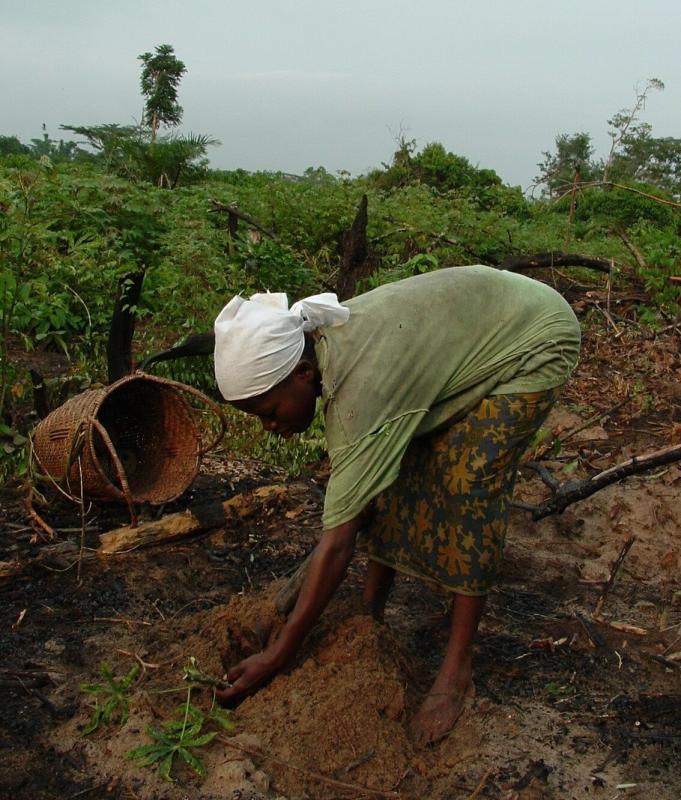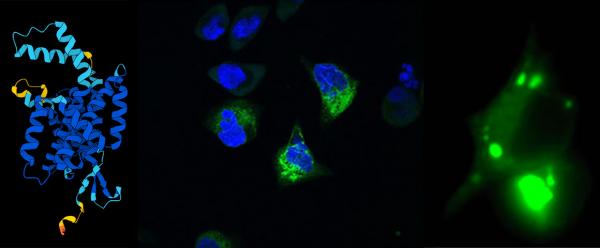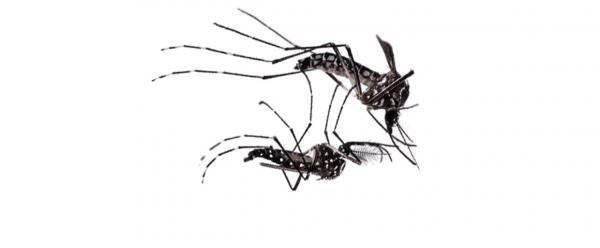Results & impact 2 April 2024
- Home
- Press area
- Press releases
- Social factors affect spread of viral diseases
Scientists show that different kinship systems within traditional farming communities in Africa affect spread of variants of pandemic crop viruses

Woman planting cassava cuttings infected by mosaic disease (Gabon, 2004) © Marc Delêtre
In research published today in the leading journal Nature Communications, Dr Marc Delêtre and his colleagues at NUI Galway, in collaboration with Dr Jean-Michel Lett from CIRAD, the French Agricultural Research Centre for International Development, have combined anthropological field research in Gabon (Central Africa) with molecular plant virus epidemiology to analyse factors that influence the spread of viruses responsible for Cassava Mosaic Disease (CMD), one of the most important virus crop diseases in Africa. Results revealed contrasting dynamics of viral diversity in patrilineal and matrilineal communities, directly related to differences in the way farmers exchange cassava varieties in the two social systems.
Dr Marc Delêtre, who conducted the interdisciplinary research in Prof. Charles Spillane’s Genetics & Biotechnology Lab in NUI Galway as part of his Marie Curie-funded postdoctoral research project, analysed the DNA sequence of plant viruses in infected cassava plants collected from different villages across the country, and found that the diversity of the viral variants causing cassava mosaic disease was much higher in matrilineal communities compared to patrilineal communities. “I have been working in Gabon since 2004, interviewing farmers, recording varieties and collecting samples. I discovered that there is a strong relationship between rules that control exchanges of cassava landraces between smallholder farming communities and rules that govern the transmission of the clan (kinship), with a direct impact on the dynamics of crop genetic diversity”.
In matrilineal societies, farmers readily import new cassava varieties through matrimonial networks, and as a result varietal diversity increases in the community. In patrilineal villages, farmers rely mainly on small sets of heirloom crop varieties. On average, cassava varietal diversity is five times higher in matrilineal villages than it is in patrilineal ones. However, communities who exchange germplasm are also more exposed to new viral variants. “Seed exchange networks play an active role in the dynamics of agrobiodiversity and can make smallholder farming systems more robust to pathogens where they favour the adoption of disease-resistant varieties; however, they can also make these systems more vulnerable if they facilitate the dissemination of seedborne plant pathogens. What we found is that there is also a cultural component to crop plant epidemiology.”
Cassava mosaic disease is one of the most important virus crop diseases in Africa, causing losses of 20-95% of cassava harvests and economic losses estimated at US$ 1.2-2.3 billion each year in Africa. With the threat of other crop pandemics spreading across Africa, such as Cassava Brown Streak Disease, an emerging threat to regional food security, understanding how social systems can drive transmission of crop viruses is key to designing and promoting local strategies for preventing or curbing the spread of crop pandemics.
Prof. Charles Spillane, Director of the Ryan Institute at NUI Galway, highlighted that “understanding different social systems is critical for understanding the transmission and evolution of pandemic viruses, whether they are viruses infecting humans, livestock or crops. Genetic epidemiology combined with understanding of social interaction systems can generate the knowledge necessary for reducing the transmission of viral diseases that are catastrophic for the poorest or most marginalized in society. The findings of this interdisciplinary research will inform new approaches for reducing the burden of viral disease on staple crops of smallholders in Africa.”
Reference
Marc Delêtre, Jean-Michel Lett, Ronan Sulpice, Charles Spillane. 2021. Kinship networks of seed exchange shape spatial patterns of plant virus diversity. Nature Communications.


























